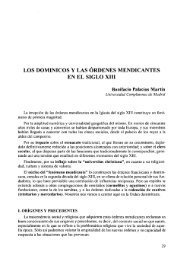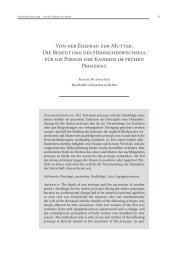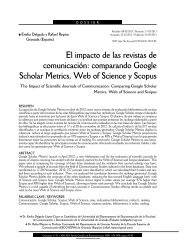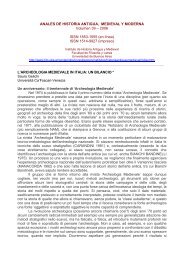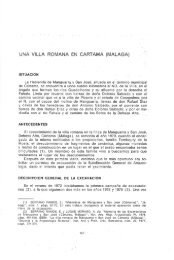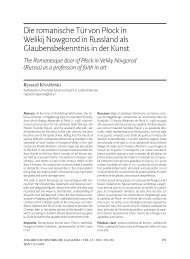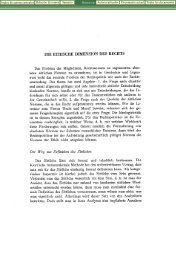Roslyn M. Frank 1.0. Introduction In the first chapter of this ... - Dialnet
Roslyn M. Frank 1.0. Introduction In the first chapter of this ... - Dialnet
Roslyn M. Frank 1.0. Introduction In the first chapter of this ... - Dialnet
Create successful ePaper yourself
Turn your PDF publications into a flip-book with our unique Google optimized e-Paper software.
114<br />
<strong>Roslyn</strong> M. <strong>Frank</strong><br />
Left in isolation with no explanatory cultural resources available, <strong>the</strong> person<br />
who suffers from <strong>the</strong>se symptoms must search on her own for an explanation<br />
and a way <strong>of</strong> determining <strong>the</strong> identity <strong>of</strong> <strong>the</strong> «intruder» or «sensed presence».<br />
And, that attempt, as is well documented, <strong>of</strong>ten gives rise to significant levels <strong>of</strong><br />
anxiety and <strong>the</strong> suspicion that <strong>the</strong> person is under direct attack by <strong>the</strong> supernatural<br />
forces or when <strong>the</strong> substantive reality <strong>of</strong> <strong>the</strong>se forces is rejected, that <strong>the</strong><br />
person is in danger <strong>of</strong> losing her mind (De Blécourt 2003; Harris 2004; Hinton,<br />
Hufford and Kirmayer 2005; Hufford 1982, 2003, 2005; Liddon 1967). Cheyne<br />
(2001: 133) describes <strong>this</strong> condition as follows:<br />
A «sensed presence» <strong>of</strong>ten accompanies hypnagogic and hypnopompic hallucinations<br />
associated with sleep paralysis. Qualitative descriptions <strong>of</strong> <strong>the</strong> sensed presence<br />
during sleep paralysis are consistent with <strong>the</strong> experience <strong>of</strong> a monitoring, stalking<br />
predator. It is argued that <strong>the</strong> sensed presence during sleep paralysis arises because<br />
<strong>of</strong> REM-related endogenous activation <strong>of</strong> a hypervigilant and biased attentive<br />
state, <strong>the</strong> normal function <strong>of</strong> which is to resolve ambiguities inherent in biologically<br />
relevant threat cues. Given <strong>the</strong> lack <strong>of</strong> disambiguating environmental cues, however,<br />
<strong>the</strong> feeling <strong>of</strong> presence persists as a protracted experience that is both numinous and<br />
ominous. This experience, in turn, shapes <strong>the</strong> elaboration and integration <strong>of</strong> <strong>the</strong> concurrent<br />
hallucinations that <strong>of</strong>ten take on supernatural and daemonic qualities.<br />
It is not surprising, <strong>the</strong>refore, that in reports written by those who have experienced<br />
SP perhaps <strong>the</strong> most common descriptive adjective employed to communicate<br />
what <strong>the</strong> experience provokes in <strong>the</strong>m is «terror», even when <strong>the</strong> individual<br />
suffering from <strong>the</strong> condition is totally familiar with <strong>the</strong> <strong>of</strong>ficial scientific<br />
definition and explanation <strong>of</strong> it:<br />
At <strong>this</strong> point, having had so many <strong>of</strong> <strong>the</strong>se experiences, I usually realize I am<br />
having an episode and try to remain calm. But trying to remain calm never works.<br />
Never. That’s <strong>the</strong> «thing» about Sleep Paralysis that is amazing – no matter how<br />
many times you go through it and know what is happening (more or less) <strong>the</strong> fear and<br />
terror are so undeniably great that it overpowers every rational thought you try to<br />
have. The feeling <strong>of</strong> impending doom is just too real and <strong>the</strong> terror is undeniable. All<br />
<strong>the</strong> while I try to wake myself up – but I am paralyzed. ([Furzdurzelette] 2008)<br />
<strong>In</strong>deed, one <strong>of</strong> <strong>the</strong> recurring <strong>the</strong>mes is <strong>the</strong> <strong>the</strong> pr<strong>of</strong>ound sense <strong>of</strong> panic produced<br />
by <strong>the</strong> conviction that <strong>the</strong> «presence» intends to carry <strong>of</strong>f its victim: «[…]<br />
more specifically, it feels like something is coming to get me and carry me away<br />
[…]. I fell into <strong>this</strong> dream world, and again I was panicking. I was getting really<br />
sick <strong>of</strong> <strong>the</strong>se dreams, more specifically <strong>the</strong> terror and anxiety (that something<br />
was coming for me)» (Timohy 2001).<br />
<strong>In</strong> contrast to <strong>the</strong> socio-culturally unmediated experience <strong>of</strong> people in contemporary<br />
Western cultures (Fukuda et al. 1987, 1998; Hinton et al. 2005),



